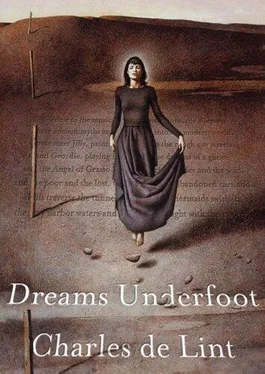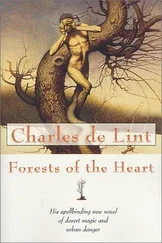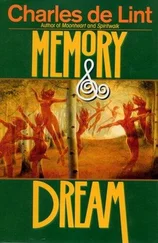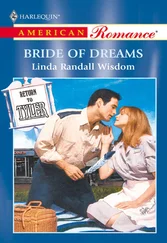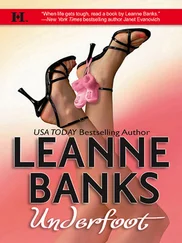His face lit up when she came in the door. He was all lines and bones, as he liked to say; a skinny man, made almost cadaverous by age. His cheeks were hollowed, eyes sunken, torso collapsed in on itself. His skin was wrinkled and dry, his hair just a few white tufts around his ears. But whatever ruin the years had brought to his body, they hadn’t managed to get even a fingerhold on his spirit. He could be cantankerous, but he was never bitter.
She’d first met him last spring. His son had died, and with nowhere else to go, he’d come to live at St. Vincent’s. From the first afternoon that she met him in his room, he’d become one of her favorite people.
“You’ve got that look,” he said after she’d kissed his cheek and sat down on the edge of his bed.
“What look?” Jilly asked, pretending ignorance.
She often gave the impression of being in a constant state of confusion—which was what gave her her charm, Sue had told her more than once—but she knew that Frank wasn’t referring to that. It was that strange occurrences tended to gather around her; mystery clung to her like burrs on an old sweater.
At one time when she was younger, she just collected folktales and odd stories, magical rumors and mythologies—much like Geordie’s brother Christy did, although she never published them. She couldn’t have explained why she was drawn to that kind of story; she just liked the idea of what they had to say.
But then one day she discovered that there was an alternate reality, and her view of the world was forever changed.
It had felt like a curse at first, knowing that magic was real, but that if she spoke of it, people would think her mad. But the wonder it woke in her could never be considered a curse and she merely learned to be careful with whom she spoke. It was in her art that she allowed herself total freedom to express what she saw from the corner of her eye. An endless stream of faerie folk paraded from her easel and sketchbook, making new homes for themselves in back alleys and city parks, on the wharves down by the waterfront or in the twisty lanes of Lower Crowsea.
In that way, she and Frank were much alike. He’d been a writer once, but, “I’ve told all the tales I have to tell by now,” he explained to July when she asked him why he’d stopped. She disagreed, but knew that his arthritis was so bad that he could neither hold a pencil nor work a keyboard for any length of time.
“You’ve seen something magic,” he said to her now.
“I have,” she replied with a grin and told him of her morning.
“Show me your sketches,” Frank said when she was done.
Jilly dutifully handed them over, apologizing for the rough state they were in until Frank told her to shush. He turned the pages of the sketchbook, studying each quick drawing carefully before going on to the next one.
“They’re gemmin,” he pronounced finally.
“I’ve never heard of them.”
“Most people haven’t. It was my grandmother who told me about them—she saw them one night, dancing in Fitzhenry Park—but I never did.”
The wistfulness in his voice made Jilly want to stage a breakout from the old folk’s home and carry him off to the Tombs to meet Babe, but she knew she couldn’t. She couldn’t even bring him home to her own loft for the holidays because he was too dependent on the care that he could only get here. She’d never even be able to carry him up the steep stairs to her loft.
“How do you know that they’re gemmin and whatever are gemmin?” she asked.
Frank tapped the sketchbook. “I know they’re gemmin because they look just like the way my gran described them to me. And didn’t you say they had violet eyes?”
“But only Babe’s got them.”
Frank smiled, enjoying himself. “Do you know what violet’s made up of?”
“Sure. Blue and red.”
“Which, symbolically, stand for devotion and passion; blended into violet, they’re a symbol of memory.”
“That still doesn’t explain anything.”
“Gemmin are the spirits of place, just like hobs are spirits of a house. They’re what make a place feel good and safeguard its positive memories. When they leave, that’s when a place gets a haunted feeling.
And then only the bad feelings are left—or no feelings, which is just about the same difference.”
“So what makes them go?” Jilly asked, remembering what Babe had said earlier.
“Nasty things happening. In the old days, it might be a murder or a battle. Nowadays we can add pollution and the like to that list.”
“But—”
“They store memories you see,” Frank went on. “The one you call Babe is the oldest, so her eyes have turned violet.”
“So,” Jilly asked with a grin. “Does it make their hair go mauve, too?”
“Don’t be impudent.”
They talked some more about the gemmin, going back and forth between, “Were they really?” and
“What else could they be?” until it was time for Frank’s supper and Jilly had to go. But first she made him open his Christmas present. His eyes filmed when he saw the tiny painting of his old house that Jilly had done for him. Sitting on the stoop was a younger version of himself with a small faun standing jauntily behind him, elbow resting on his shoulder.
“Got something in my eye,” he muttered as he brought his sleeve up to his eyes.
“I just wanted you to have this today, because I brought everybody else their presents,” filly said,
“but I’m coming back on Christmas—we’ll do something fun. I’d come Christmas eve, but I’ve got to work at the restaurant that night.”
Frank nodded. His tears were gone, but his eyes were still shiny. “The solstice is coming,” he said.
“In two days.”
Jilly nodded, but didn’t say anything.
“That’s when they’ll be going,” Frank explained. “The gemmin. The moon’ll be full, just like Babe said. Solstices are like May Eve and Halloween—the borders between this world and others are thinnest then.” He gave Jilly a sad smile. “Wouldn’t I love to see them before they go.”
Jilly thought quickly, but she still couldn’t think of any way she could maneuver him into the Tombs in his chair. She couldn’t even borrow Sue’s car, because the streets there were too choked with rubble and refuse. So she picked up her sketchbook and put it on his lap.
“Keep this,” she said.
Then she wheeled him off to the dining room, refusing to listen to his protests that he couldn’t.
* * *
A sad smile touched Jilly’s lips as she stood in the storm, remembering. She walked down the alleyway and ran her mittened hand along the windshield of the Buick, dislodging the snow that had gathered there. She tried the door, but it was rusted shut. A back window was open, so she crawled in through it, then clambered into the front seat, which was relatively free of snow.
It was warmer inside—probably because she was out of the wind. She sat looking out the windshield until the snow covered it again. It was like being in a cocoon, she thought. Protected. A person could almost imagine that the gemmin were still around, not yet ready to leave. And when they did, maybe they’d take her with them ....
A dreamy feeling stole over her and her eyes fluttered, grew heavy, then closed. Outside the wind continued to howl, driving the snow against the car; inside, Jilly slept, dreaming of the past.
The gemmin were waiting for her the day after she saw Frank, lounging around the abandoned Buick beside the old Clark Building. She wanted to talk to them about what they were and why they were going away and a hundred other things, but somehow she just never got around to any of it. She was too busy laughing at their antics and trying to capture their portraits with the pastels she’d brought that day.
Читать дальше
